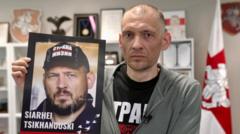Kabila's speech follows the lifting of his legal immunity, with impending charges of treason and war crimes tied to the M23 rebellion, revealing the deepening political strife in DR Congo.
**Kabila Returns with Sharp Criticism of Current Regime as Legal Troubles Loom**

**Kabila Returns with Sharp Criticism of Current Regime as Legal Troubles Loom**
Former Congolese President Joseph Kabila labels the current government a "dictatorship" in a charged address.
Joseph Kabila, the former president of the Democratic Republic of Congo, has publicly condemned the current regime led by his successor, Félix Tshisekedi, branding it as a "dictatorship". Kabila's remarks come just a day after the Senate stripped him of his immunity from prosecution, preparing to charge him with treason and war crimes, with allegations linking him to the Rwandan-backed M23 rebels who have surged in the eastern regions.
In a significant 45-minute address streamed live on YouTube on Friday, Kabila broke his long silence from an undisclosed location. He expressed deep concern over the nation’s unity, asserting that governance under Tshisekedi is characterized by arbitrary actions that threaten democracy. Kabila, who governed from 2001 until 2019, attributed the escalating chaos to the misuse of power by the current leadership, highlighting recent governmental bans on his party and asset confiscation.
The ex-president, currently residing outside the country, indicated his return might occur soon as he plans to visit Goma, an area currently under M23 control, which he perceives as a safer environment. His speech also presented a detailed 12-point plan aimed at addressing the ongoing insecurity that has plagued the resource-rich eastern Congo for years.
Kabila didn't shy away from criticizing government actions regarding economic mismanagement, citing soaring public debt and widespread corruption. He lamented the decay of the national army, which he claimed had been replaced with mercenary and militia groups. Furthermore, Kabila called for the withdrawal of foreign military presence in DR Congo, responding to regional dynamics that have seen Rwandan forces involved in the conflict.
His address resonates amidst mixed reactions, some observers pointing out Kabila’s criticisms mirror those directed at his administration during his time in power. He concluded his remarks, insisting that "the dictatorship must end" and advocated for the restoration of democracy and effective governance as essential for national recovery.
While Kabila’s attempt to regain influence remains contentious, regional tensions with Rwanda are reportedly moving towards reconciliatory measures, as both nations grapple with the ongoing instability arising from the M23 uprising, displacing countless civilians over recent months.
In a significant 45-minute address streamed live on YouTube on Friday, Kabila broke his long silence from an undisclosed location. He expressed deep concern over the nation’s unity, asserting that governance under Tshisekedi is characterized by arbitrary actions that threaten democracy. Kabila, who governed from 2001 until 2019, attributed the escalating chaos to the misuse of power by the current leadership, highlighting recent governmental bans on his party and asset confiscation.
The ex-president, currently residing outside the country, indicated his return might occur soon as he plans to visit Goma, an area currently under M23 control, which he perceives as a safer environment. His speech also presented a detailed 12-point plan aimed at addressing the ongoing insecurity that has plagued the resource-rich eastern Congo for years.
Kabila didn't shy away from criticizing government actions regarding economic mismanagement, citing soaring public debt and widespread corruption. He lamented the decay of the national army, which he claimed had been replaced with mercenary and militia groups. Furthermore, Kabila called for the withdrawal of foreign military presence in DR Congo, responding to regional dynamics that have seen Rwandan forces involved in the conflict.
His address resonates amidst mixed reactions, some observers pointing out Kabila’s criticisms mirror those directed at his administration during his time in power. He concluded his remarks, insisting that "the dictatorship must end" and advocated for the restoration of democracy and effective governance as essential for national recovery.
While Kabila’s attempt to regain influence remains contentious, regional tensions with Rwanda are reportedly moving towards reconciliatory measures, as both nations grapple with the ongoing instability arising from the M23 uprising, displacing countless civilians over recent months.























